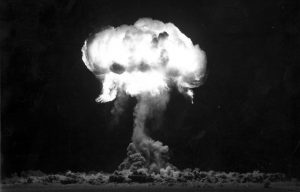Hibakusha
 I have been thinking about the recent talk of atomic weapons that has become prominent in the ebb and flow of the news. The leader of North Korea has initiated a series of atomic tests culminating in a claim to now have a fusion weapon, a hydrogen bomb. To sharpen the point, long range missile tests have been conducted. Our president, quite unable to exercise the restraint that diplomacy demands, has attempted to match the bellicose rhetoric coming from Kim Jong Un. So here we are, fearful that the next shoe will drop.
I have been thinking about the recent talk of atomic weapons that has become prominent in the ebb and flow of the news. The leader of North Korea has initiated a series of atomic tests culminating in a claim to now have a fusion weapon, a hydrogen bomb. To sharpen the point, long range missile tests have been conducted. Our president, quite unable to exercise the restraint that diplomacy demands, has attempted to match the bellicose rhetoric coming from Kim Jong Un. So here we are, fearful that the next shoe will drop.
All of this brought back memories of when I lived in Japan. My memories are of individuals, horribly disfigured from the 1945 H bomb blasts in Hiroshima and Nagasaki that I would pass from time to time. They would sit silently, alone in a very busy railway station holding a large sign. The individual begged for contributions from passersby. They were called Hibakusha (被爆者) in Japanese. The word means blast and radiation survivor. I was unnerved by these individuals. Forty years later, I remember clearly what I saw.
I offer two excerpts relevant to the matter of atomic weapons. The first is a quotation by J. Robert Oppenheimer upon witnessing the first test-atomic explosion at the Trinity Site on July 16, 1945. Oppenheimer was face down in the control bunker 10,000 yards south of ground zero. The sight of the apparitional mushroom cloud rising into the sky caused the physicist to remember these words:
Now I am become Death, the destroyer of worlds.
—chapter 11 verse 32 of the Bhagavad-Gita
My second quote is more extended and comes from a science fiction story authored by Walter M. Miller Jr, A Canticle for Leibowitz published in 1959. The story is a speculative imagining of the future post Hiroshima.
They sang as they lifted the children into the ship. They sang old space chanteys and helped the children up the ladder one at a time and into the hands of the sisters. They sang heartily to dispel the fright of the little ones. When the horizon erupted, the singing stopped. They passed the last child into the ship.
The horizon came alive with flashes as the monks mounted the ladder. The horizons became a red glow. A distant cloudbank was born where no cloud had been. The monks on the ladder looked away from the flashes. When the flashes were gone, they looked back.
The visage of Lucifer mushroomed into hideousness above the cloudbank, rising slowly like some titan climbing to its feet after ages of imprisonment in the Earth.
4 thoughts on “Hibakusha”
What was going through J. Robert Oppenheimer’s head when he saw the great fireball of the Trinity test looming above him? According to his brother, Frank, he only said, “it worked.”
http://blog.nuclearsecrecy.com/2014/05/23/oppenheimer-gita/
I doubt that Oppenheimer had only on thought in mind upon the experience of the test. What he said stands. Oppenheimer was a brilliant individual He taught himself Sanskrit in order to read the Gita in the language it was written. He used the philosophy of the Bhagavad-Gita to make sense of his actions.
But the question still remains, did he really say it?
I was not there and neither were you. Oppenheimer read Sanskrit (self taught) which is arguably the most difficult of languages to master. It is reasonable to believe that he did say it. Believe what you want. You do not need any reason to express your denial. I think that atomic weapons ought to be outlawed as we have done with poison gas.